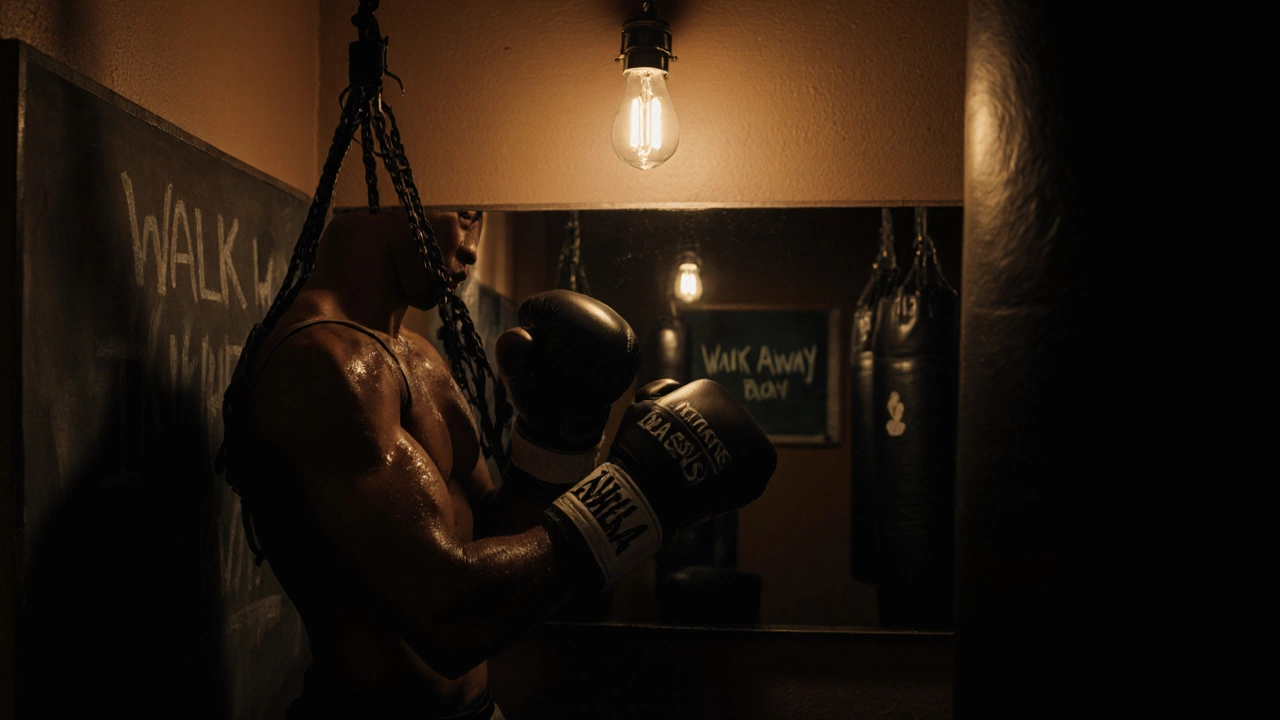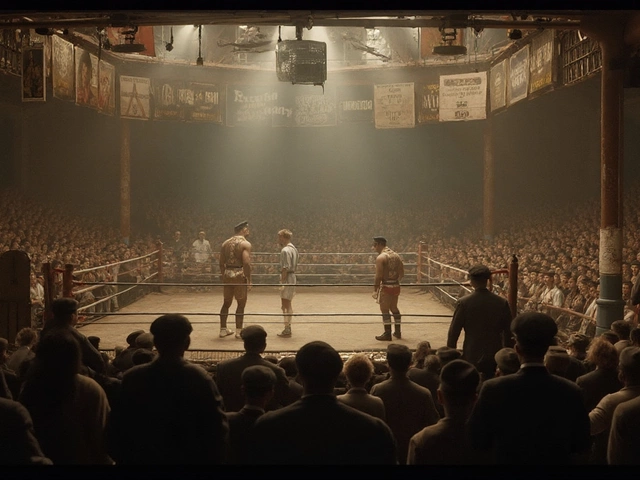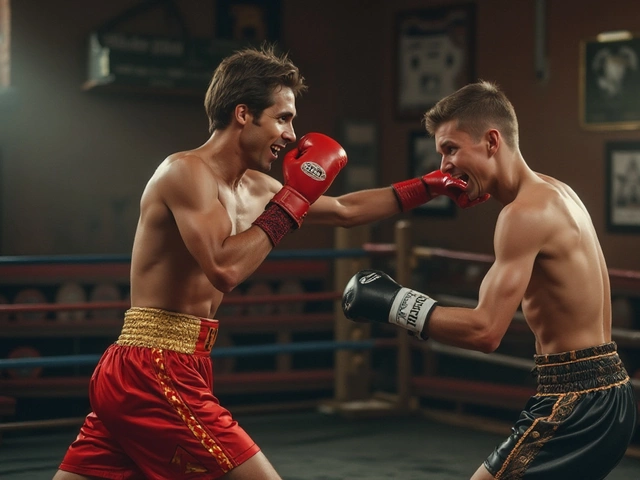Why Do Boxers Avoid Street Fights?

Boxer Self-Defense Risk Calculator
Assess Your Situation
This calculator uses principles from the article "Why Do Boxers Avoid Street Fights?" to assess your risk level. Enter your situation details below.
Boxers don’t walk away from conflict because they’re scared. They avoid street fights because they know exactly what happens when the rules disappear.
The Rules Are the Shield
In a boxing ring, there are clear boundaries. No eye gouging. No kicking. No weapons. No hitting below the belt. Referees stop the fight if someone’s in danger. The clock runs only when the action is legal. The gloves? They’re not just padding-they’re a control mechanism. They reduce cuts, spread impact, and limit knockout power. A 16-ounce glove changes how a punch lands. It turns a skull-cracking blow into a dazing one.Step outside that ring, and every rule vanishes. A street fight has no referee. No time limit. No weight class. No one’s watching to make sure it’s fair. One wrong move, and a boxer-who trained for clean, controlled strikes-could face a broken hand, a broken nose, or worse.
Training Doesn’t Prepare You for Chaos
Boxers spend years learning to slip, block, and counter in a predictable environment. They drill footwork, timing, and rhythm. They study opponents’ tendencies. They condition their bodies to absorb punishment under controlled stress.But street fights aren’t chess. They’re a blur of adrenaline, surprise, and dirty tactics. Someone might throw a bottle. A friend might jump in. A bystander might shove you into a wall. A guy with a knife doesn’t care if you’ve got a 40% win rate. You can be the best boxer in the world, but if you’re caught off guard in a parking lot at 2 a.m., your technique means nothing.
Real fighters know this. They’ve seen it. A former pro I trained with in Adelaide once told me about a guy who walked into a bar brawl with a perfect jab. He landed it. Then got stabbed in the ribs from behind. He didn’t die. But he never boxed again.
The Legal and Financial Cost
Boxers aren’t just risking injury-they’re risking their careers. Even if you’re the victim, the law doesn’t always see it that way. In Australia, self-defense laws require you to prove you had no other option. If you’re known as a trained fighter, prosecutors can argue you had the skill to walk away. That’s not speculation-it’s happened.In 2022, a former Australian amateur champion got charged with assault after breaking up a fight outside a pub. He claimed he was protecting someone. The court didn’t buy it. He lost his coaching license for a year. His sponsor dropped him. His name showed up in local news for all the wrong reasons.
Boxers know: a street fight isn’t just a brawl. It’s a lawsuit waiting to happen. A criminal record. A ruined reputation. A lifetime of explaining why you didn’t just leave.

Respect, Not Fear
It’s not about being afraid of getting hit. It’s about knowing what you’re capable of-and how dangerous that can be.Boxers carry a quiet confidence. They’ve been punched. They’ve bled. They’ve woken up with swollen eyes and aching ribs. They’ve also trained with people who’ve lost fights, lost jobs, lost families because of one bad decision in a moment of anger.
So when someone tries to provoke them, they don’t react. They don’t need to prove anything. They’ve already proven it-in the ring, in the gym, in the mirror. They know the truth: the best punch is the one you never throw.
What Happens When They Do Fight Outside the Ring?
Some boxers do get into street fights. Usually, it’s not about ego. It’s about survival.There’s a difference between a drunk guy yelling and someone pulling a knife. A trained fighter won’t hesitate to defend themselves if their life is in danger. But they won’t escalate. They won’t start it. They won’t linger. They’ll end it fast, cleanly, and get out.
One ex-pro I knew in Melbourne used to say: “I don’t need to win a street fight. I just need to make sure I walk away.” He once broke a guy’s jaw in a confrontation outside a convenience store. The guy had a gun. The boxer didn’t wait to see if it was loaded. He moved in, landed a single uppercut, and ran. Police arrived five minutes later. The guy was arrested for carrying an unlicensed firearm. The boxer? He gave a statement. Walked away with no charges.
That’s the difference between a fighter and a fool.

It’s Not About Being Weak-It’s About Being Smart
People think avoiding street fights means you’re soft. That’s not true. It means you understand power.A boxer doesn’t need to fight to prove they’re strong. They’ve already shown it. Every early morning run. Every sparring session. Every time they got up after being knocked down. That’s the real strength.
Street fights don’t build character. They destroy lives. Careers. Relationships. Futures.
Boxers know that. That’s why they walk away. Not because they can’t fight. But because they’ve already fought-and won-inside the ring. And they know the real fight is staying out of the chaos.
What Boxers Do Instead
Most boxers don’t just avoid fights-they train others to avoid them too.Coaches teach kids: “If you can walk away, walk away.” They drill situational awareness. They teach de-escalation. They show how to read body language before violence starts. They don’t just train fists. They train judgment.
Many boxers become security guards, bouncers, or martial arts instructors. They use their skills to prevent violence, not start it. One gym in Adelaide runs a free program for teens who’ve been bullied. The goal? Not to turn them into fighters. To turn them into people who know how to stay safe.
That’s the legacy of real boxing. Not the knockouts. Not the trophies. But the discipline to choose peace-even when you’re the strongest person in the room.
Final Thought: The Real Champion
The loudest person in the gym isn’t always the best boxer. The quiet one who shows up every day, who takes the hits, who never talks trash-that’s the one who walks away from the street fight.Champions aren’t made by how many people they knock out. They’re made by how many fights they avoid.
Do boxers ever win street fights?
Yes, but winning isn’t the point. A boxer might end a street fight quickly due to their skill, but they still risk legal trouble, injury, or worse. Even if they "win," they often lose more-career, freedom, reputation. Real fighters don’t seek to win street fights. They seek to avoid them.
Why don’t boxers use their skills for self-defense?
They do-but only when necessary. Boxers are trained to end threats fast and safely, not to engage in prolonged fights. Their goal is to escape, not to dominate. Using skills in self-defense means acting under extreme stress with no rules, no gloves, and no referee. That’s why they train for awareness and de-escalation first.
Is it illegal to be a boxer and get into a fight?
No, it’s not illegal to be a boxer. But if you’re involved in a street fight, your training can work against you in court. Prosecutors may argue you had the ability to avoid violence, making your actions look more aggressive than defensive. Many boxers have faced charges or lost licenses because of this legal bias.
Do professional boxers carry weapons for protection?
No. Most don’t. Carrying weapons is illegal in most places, including Australia. More importantly, trained fighters know weapons change the game entirely-and the consequences are irreversible. They rely on awareness, distance, and de-escalation instead. If they feel unsafe, they leave.
Can a boxer get arrested for defending themselves?
Yes. In Australia, self-defense laws require you to prove you had no other choice. If you’re known as a trained fighter, authorities may assume you could have walked away. Even if you were attacked, your skill level can be used against you. Many boxers avoid confrontations not out of fear, but to protect their freedom.




